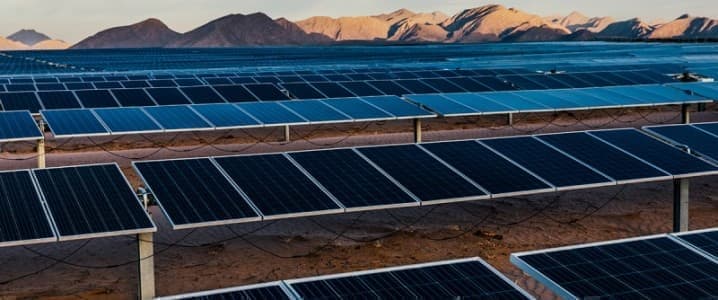Global investment in renewable energy is set to surpass oil and gas for the first time ever next year, according to a new report. Trillions of dollars are slated to pour into wind, solar, batteries, EVs and green infrastructure in the coming decade. “[W]e estimate that clean tech can drive US$1-2 [trillion per year] of green infrastructure investments and create 15-20 [million] jobs worldwide,” Goldman Sachs said in a lengthy new report it calls “Carbonomics.”
As soon as 2021, renewable energy will capture more investment than oil and gas, and renewables could see $16 trillion in investment through 2030, according to Goldman Sachs. That would keep the world on track to avoid more than 2 degrees Celsius of warming, although regulatory and policy changes are still necessary for this scenario to play out.
The timing of the change is important. Goldman says that a wave of clean tech investment “has a major role to play in the upcoming economic recovery,” noting that green infrastructure is 1.5 to 3 times more capital- and job-intensive than fossil fuels. It is a “strong example of pro-growth pro-environment public-private collaboration,” Goldman analysts wrote. Every 1 euro spent on renewables translates into 1-10 euros of GDP growth, Goldman said, citing data from IRENA.
While there are calls for a Green New Deal in the U.S. and similar versions in Europe, investors are also participating in and driving some of the shift. That will increasingly be the case as the cost of renewables continues to decline and the investment case in oil and gas continues to sour. “[F]inancial conditions keep tightening for long-term hydrocarbon developments, creating higher barriers to entry, lower activity, and ultimately lower oil & gas supply in our view,” the investment bank said.
Related: Saudi Arabia’s Oil Exports To The U.S. Set To Drop To 35-Year Low
Investment in upstream oil and gas is expected to plunge by $156 billion this year, or 29 percent, according to Rystad Energy.
Most glaringly, Goldman Sachs said that the cost of capital for new oil and gas projects vastly exceeds that of renewable energy. Goldman puts hurdle rates for new oil and gas projects at 10 to 20 percent, while renewables only see 3 to 5 percent cost of capital. In other words, it is cheaper and less risky to invest in clean tech than it is for fossil fuels.
“We estimate that this divergence in the cost of capital for high carbon vs. low-carbon investments implies a carbon price of US$40-80/ton, well above most carbon pricing schemes,” Goldman Sachs said.
The implications of diverging costs of capital for fossil fuels versus renewables are significant. “[T]his is structurally constraining the oil & gas industry’s ability to invest,” the bank said, noting that capex on new long-cycle oil projects has plunged by 60 percent in the past five years.
Oil industry proponents argue that the lack of investment today merely sows the seeds of the next boom cycle, with rising crude oil prices putting oil and gas back in a stronger position. Goldman agrees on the upcycle aspect of that argument, but not on the conclusion that it ultimately benefits oil and gas. “This shifts, in our view, the stranded asset debate from a demand problem to a cost of capital problem and could lead to an energy transition through higher oil & gas prices,” bank analysts warned.
Related: Pirates Threaten Oil Operations In Gulf Of Mexico
Some of the oil majors have already begun to undertake a tepid transformation, at least those in Europe. Royal Dutch Shell, Total SA and BP have said they are aiming to become a net-zero emissions companies by 2050. And Reuters just reported that Eni’s CEO Claudio Descalzi is hoping to pivot with the energy transition, greening the company so that it can survive into the future. “In these next 3 years I want to trace a completely irreversible path for the group,” Descalzi said.
BP’s $17.5 billion writedown just days ago should also be viewed in the context of the deteriorating position of oil and gas. “Everywhere I have been — inside BP, as well as outside — I have come away with one inescapable conclusion,” BP’s CEO Bernard Looney said in a speech earlier this year. “We have got to change.”
It remains to be seen how serious these pledges are. The majors have spent years engaging in clever PR to portray themselves as serious about climate change, while largely maintaining their existing strategies in oil and gas. For now, the oil majors invest a pittance in renewables.
But Goldman Sachs expects that shift to begin in earnest, rising for the European oil majors from 2-5 percent in 2018-2019 to roughly 10-15 percent in 2020-2021.
By Nick Cunningham of Oilprice.com
More Top Reads From Oilprice.com:
- Why The $17.5 Billion Write-Down Is Just The Beginning For BP
- China Drops Energy Efficiency Targets Amid Covid-19 Crisis
- The Oil & Gas Sector Could Already Be In Terminal Decline

















